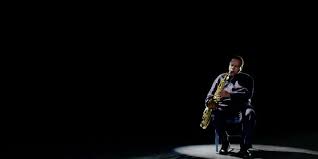Wayne Shorter: Zero Gravity Review 2023 Tv Show Series Cast Crew Online
Upfront confession: I know just enough about jazz to be dangerous. Of course, I know the big names and a bit more than that, but I would hardly call myself an aficionado. Oh, I know what I like, and I’m betting the fact that I do like jazz probably means I know more than the average bear. I love Miles Davis, John Coltrane, Charlie Parker, Charles Mingus, and in a more contemporary vein, I find the music of Kamasi Washington to be mind altering. That being said, while I may not entirely be a stranger in a strange land, I am most certainly a tourist–if a relatively well-traveled one.
That’s not to say that I wasn’t familiar with the music of saxophonist Wayne Shorter. His 1964-70 stint with Miles Davis is legendary, and his melodious playing had a lot to do with what is known as Miles’ “second great quintet” (Shorter had the unenviable task of following John Coltrane). But as one might say, there are levels to this shit, and the three-part documentary series Wayne Shorter: Zero Gravity is on a whole other plateau. It’s not just that the series is a remarkably well assembled piece full of facts, interviews, photos, and historical data, it’s beyond that. Zero Gravity is not so much a film or a series, but an experience, much in the way that Brett Morgen’s marvelous film on David Bowie, Moonage Daydream is.
To watch Zero Gravity is to go far beyond the boilerplate depiction of biographical documentaries that do the whole “this happened then that happened” sort of thing. And sure, there is a fair amount of this and that, but the presentation is what counts. Director Dorsay Alavi (heretofore unknown to me, but now never to be forgotten) uses animation and effects to give the viewer the sense of what it is to think in art, or more specifically, jazz. Often, as Wayne Shorter himself is speaking, his thoughts are embellished with imagery that ranges from illuminating to mind-blowing. This is top-level filmmaking about a subject that would have been compelling had the series been told in a conventional fashion, but Alavi doesn’t settle for the conventional. She wants to go beyond the basic details of a genius musician’s life and help you get some idea of what it is to live inside the mind of that genius.
Don’t get me wrong, if you see Zero Gravity (and if it isn’t obvious to you by now, I certainly think you should), you will learn the important details of Shorter’s extraordinary life. How the preternaturally talented horn man started out with the great Art Blakey, moved on to Miles, then started the legendary Weather Report, before going on largely alone and following his own muse for the remainder of his life (Shorter passed in March of this year after circling the planet for more than 89 extraordinary years).
Each of the series’ three segments are referred to as “portals,” which seems appropriate for episodes that really do feel like the opening of unknown doors, behind which rest uncommon delights. Portal one covers Shorter’s early years, detailing his unique ability to mimic the phrasing of any sax player from Parker to Dizzy Gillespie as he developed his own melodic but progressively experimental style. At first, Shorter is shown as a true support musician for Blakey, but when he leaves to join Miles’ band, he begins to truly blossom. As the quintet’s main composer, it is revealed that Shorter was every bit as good as Coltrane, but somehow, more prolific. The music he and Miles made together was genuinely groundbreaking, and as portal one closes, it becomes clear that Shorter is meant to leave Miles to follow his own path, something Davis himself encourages.
The series isn’t all music (although nearly every second of the film is teaming with Shorter’s wildly masterful work), Alavi makes certain to include details of Shorter’s personal life. And while the life of a musician who spends so much time on the road that his marriage fails may seem typical to the life of any traveling artist, Alavi gets to the heart of the pain of personal failure without lingering in a way that seems obtrusive or distracting from the main thrust of the series, which is to present the full visionary nature of Shorter’s career. The humanity showcased over the three episodes helps you understand how a man could suffer so much but never lose his way in regards to his vocation.
Portal two covers nearly four decades of Shorter’s life. How he and his second wife Anna-Marie struggled mightily due to having a child named Iska born with brain damage, and their twin battles with substance abuse, but also how he moved away from Miles to create one of the greatest and most successful jazz bands ever, the Weather Report. As forward thinking as his work with Miles was, the Weather Report took matters even further. As the band experimented with fusion, jazz-rock, and wherever their mighty talents took them, they managed to be both digestible to mass audiences and groundbreaking at the same time. While the lineup of the band would change over the years, he and the legendary Austrian keyboardist/composer Joe Zawinul were the mainstays. And once Jaco Pastrorius (commonly regarded as one of the greatest bass players of all time) joined the band, the Weather Report built upon their early success to become one of the hottest touring acts of their era, often eclipsing famous rock bands in the process.
But as the band got bigger and louder, Shorter began to feel lost in the cacophony, and near the apex of the band’s success, Shorter walked away to chart his own course. He began to explore Portuguese influences and orchestral sounds in a constant search to find new modes of musical expression. All the while dealing with Anna Marie’s alcoholism and the death of Iska at just fourteen from a grand mal seizure. Portal two ends with tragedy being compounded by tragedy as Anna Marie dies on TWA flight 800 when the aircraft explodes in mid-air.
That fact might lead one to believe that portal three would be a heartbroken treatise on a great musician who lived out the remainder of his life nursing a hurt that would not heal. But that was not the story of Shorter’s remaining years, and the film rightly showcases how Shorter somehow found his feet, discovered new love, and continued on as a seeker of sounds yet unheard until his final moments. Two of Shorter’s last projects were an album that came with a graphic novel, and an 2021 opera called Gaia showcasing a libretto by young gun Esperanza Spalding that debuted after Shorter’s 88th year on earth.
There was nothing stuffy or backward-looking about Wayne Shorter. He not only took young musicians under his wing and pushed them to stretch their talents, he continued to do the same with his own. Ever restless, ever searching, Shorter was in a constant state of discovery until his death. At one point, Shorter is heard saying that his music is never finished, that it is always in a state of “to be continued, I’ll see you later.”
Near the end of this extraordinary series, Shorter states, “Jazz is like saying once upon a time…and then fill in the blanks.” Thanks to Zero Gravity, I am starting to fill in the blanks. As I said at the beginning of this review, I started out knowing just enough about jazz to be dangerous. After watching Zero Gravity, I am feeling much more dangerous now.




